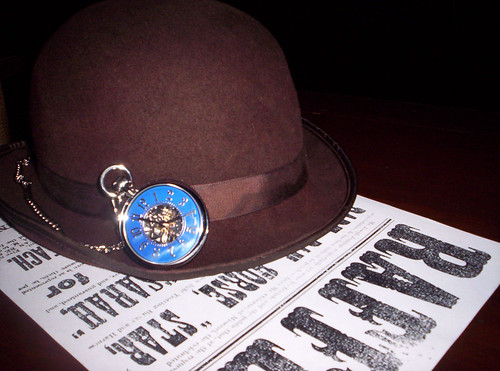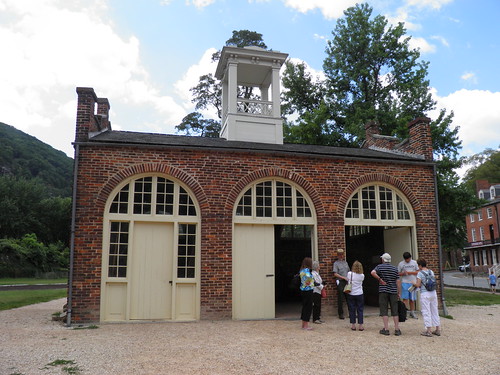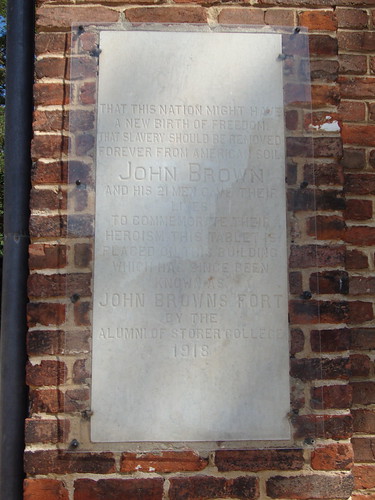-----
I read Louis De Caro's "John Brown the Abolitionist -- A Biographer's Blog" regularly because I deeply respect the work which DeCaro has done in researching Brown, particularly putting him into the context of his religious life. I assigned "Fire from the Midst of You": A Religious Life of John Brown to the students in my class this semester on Brown, as it is an intriguing look at the abolitionist. But I read DeCaro's blog because I don't agree with him on many of his criticisms of how Brown is interpreted in a modern context. I try to follow a rule of thumb: you need to read those with whom you disagree voraciously, to keep you from growing complacent in your opinions.
DeCaro repeatedly has expressed issues with how the National Park Service (and others) have interpreted Brown's raid and his justification in taking others' lives, most recently in his post about the Smithsonian's "Time Trial of John Brown," a program which Jake highlighted last week. DeCaro is critical of the Smithsonian's Susan Evans' statement that, "We don’t want to make out John Brown to be a hero at all...." He continues, stating that, "...like the staff at the National Park Service at Harper’s Ferry, evidently the staff at the Smithsonian Institute’s Museum/Theater have an opinion about Brown."
 |
| The hat I wore at Harpers Ferry, atop a period advertisement for a slave raffle. |
So what's my opinion on Brown? I think he struck the match for a holy war, a war that was guided by a principle that there is law and there is justice, and the two don't always meet. I think he struck for freedom, using violence to combat a violent system and begin the destruction of the purely evil concept of human chattel slavery. I think that Brown was, to some degree, just. I hate violence, I don't think it is the right answer, but I can understand and appreciate how someone might come to the conclusion that it is necessary. I have never had chains on my wrists, never been dragged along in a coffle, and never seen friends subjected to that treatment. I simply don't know what violence would well up in my soul if placed in the position of a Dangerfield Newby, Shields Green or John Brown.
Here's the clincher, though: my opinion of the justice of Brown's actions matters not one lick. My opinion is not valid in the case of Interpretation. Instead, it comes down to the visitors' opinions of Brown and his raid. The difference between History and Interpretation is a question of dictatorship, muddied by an intersection of language.
 | |
| Above all else, this is a place to investigate ideas. / CC by Mike Sheridan |
History, on the other hand, is chiefly instructive. Any historical monograph has a deep seated position, with which it is the author's aim to entice, persuade, goad and sometimes even force the audience to agree. There are right interpretations and wrong interpretations in History, with opinions being as sacrosanct and immovable as the facts and information upon which they are based. There are experts, there to impart a distinct view and interpretation of an event or place or person.
Note that word: interpretation. This is where understandings of the fundamental differences between the two fields begin to break down. The concept of an historical interpretation, or an opinion about what a collection of facts mean in the greater scheme, has little to do with Interpretation as an activity. Capital "I" Interpretation is about eschewing enforcement of specific interpretations on visitors. In short, the difference is as simple as the difference between dictatorship and democracy.
Those are two very loaded words. But they are illustrative. Historical dictatorship only allows one viewpoint. Like Stalin effacing malcontents from photographs or Winston Smith sliding disappeared Ingsoc Party members into a slot in his office's wall, the grand majority of facts left within historical argument are those which support a thesis, either predetermined or crafted from those facts which fit it. Historical argument, to a greater or lesser extent, is a game of stage magic. The proof of something happening comes from not only illustration, but from misdirection as well. But the clincher in this paradigm is that "p" word: proof. Historical dictatorship comes through a distinct use of an officious tone. Historians impart singular "truths" and sole meanings for events like dictators, with a sense of certitude which often the public rejects. It is a chief reason that academia is disdained by a chunk of the populace as the embodiment of arrogance: the continual hubris of thinking "we know better than you."
 |
| Was Brown a terrorist? It is a valid question. And the answer all hinges on whose eyes you try to see him through. / CC by Stephanie |
Most importantly, you don't offer a meaning. You offer the ideas of the past, the multiple perspectives, but then refrain from judgement. This is not because judgements should not be made. Everyone does have a right to judge the past and find meaning in its folds. No, this is to make sure that judgement is never imposed. Each visitor's judgement is sacred, is sovriegn. They vote on their personal meanings in a democracy of one.
I gave programs in Harpers Ferry this past summer, focusing on the moral quandary of John Brown's Raid. In it figured Dangerfield Newby, free slave and avenging husband, killed while desperately grasping for his family's freedom. In it too figured Thomas Boerly, Irish immigrant and protective husband, killed while doggedly trying to repel raiders from his town and his family's doorstep. Who was right? I never said. When you wear that badge, when you wear that hat, your word is law. Those two symbols are too powerful to make a judgement. Instead, I left it to the audience. If they walked away believing John Brown a saint, I did my job. If they walked away thinking John Brown a terrorist, I did my job. If they walked away thinking anything about John Brown, I did my job.
A friend of mine (now lost to us) wrote in his journal in 2002:
A story - that has to be the holy word. More than a plot or narrative - it has to offer real opportunities to meanings. Not a TV movie. A story has to weigh more. Be able to crack open at the details.
The formula now is really quite simple. Make people care about a character, place, - something. Then understate the obvious. First let them feel.
Letting people feel these places and draw their own conclusions is the ultimate democracy of history. Letting them question and prod from any angle, and most importantly not telling them they are wrong for a belief based in the place's story, is the ultimate opportunity to connect with a place. That's Interpretation.
Ah John I love stirring the pot with you!!
ReplyDeleteLet me begin with a wholehearted agreement on what you have written here. It goes along with historian Benedetto Croce who said "all good history is current history", and in public history and interpretation nothing could be truer.
Now on to other elements of this war. A while back we had a "spat" :-) about the meaning of the southern army. While I am staunch in my opinion, you are the same in yours. BUT I sensed a deep-seated apprehension in you to see the other side (happens to be my side but what the heck). My inclination is to say that if you acknowledged the logic of my argument than it would take a portion of the morality from your own. (Now this a NOT a jab, but an observation and Lord knows there are many places for you to jab me back.)
So, you are willing to grant legitimacy to those who see Brown as a terrorist. Ok, I can see that though I am not of that cloth. You however dont seem to grant the same legitimacy to the average soldier in gray. I find this odd.
What say you?
Robert,
ReplyDeleteI'll jump in and give your question a whirl. In no way am I speaking for John, rather, I'll attempt to address your question with some thoughts of my own...
To me, Interpretation is all about facilitating the visitor in finding his/her own judgement of, and personal meaning in, the historical resource. I don't have to agree, think it's valid, or personally grant it legitimacy. All I have to do is respect the mantra that, "the visitor is sovereign." Thus, they have the right to form their own ideas and thoughts about the historical resource.
Robby-
ReplyDeleteGod, readers must think we hate each other from reading these feuds we have, eh?
I will admit bits and pieces of hypocrisy mixed into my character (like a fine puree) but you know it's in my Yankee nature. You'll have to excuse it.
In all seriousness, though, I do try to see the world from the viewpoint of those rebels when I play the role of audience. And the depth of argument I went to in that other post would never happen on the field when I'm playing Interpreter for the NPS, unless a visitor wanted to play devil's advocate and really dig into the topic. That type of discussion is particular to the blog and the intellectual safe-zone I hope we've set up here.
All that having been said, I don't think I villainized the Confederacy or forced a negative opinion on your folks back in June out on the field. I do hope I helped them see the world from different viewpoints. How I argue on the blog and how I Interpret in the field differ quite a bit.
If someone wants to view a Confederate soldier as a patriotic defender of his homeland or Brown as a devil and busy-body tampering with the sacred institutions of the South, that's fine. Their opinion is their right. I just hope (when I have my Interpreter hat on) that they try to see the world from that other viewpoint as well, and then stick to their guns if they so wish.
OK, so that was an epistle... Sorry. I'm a good ol' Yankee blowhard full of wind. ;-)
John I seriously hope people know this is just what we do, and actually play well together. Good history arguments are something to savor. Not often you get to throw around these sorts of things and stay civil, though the red does come out on my neck at times.
ReplyDeleteOh you would be surprised to see how I tear down some of those sacred institutions when presenting to southerners. We have our own issues to say the least.
Now you just remember that we started "Friends of Professor John Rudy" in your honor :-)
thanks
ReplyDeleteIf you have to ge the information then you should come here and check every one of the information if this was related to your work. In addition, this respects have the http://www.resumes2017.com/combination-resume-format-2017/ information by then may be this is valuable for our working styles.
ReplyDeleteJohn, Thank you for this educational and thoughtful article. It was instructive and although you wrote this quite a while back, I only saw it today. You provided some informed reflection that I lacked in the past. For the record, in 2009, I was at HF for the sesquicentennial and took some time to visit the NPS center. While I was there, I listened to a uniformed gentleman from the park service at the counter as he "explained" John Brown to a tourist from abroad. His narrative was not of the approach that you described in this piece. Rather, his description of Brown sent me away believing that tourists were getting a biased, negative reading of the Old Man. In retrospect, I apologize for generalizing my criticism. All the best in your continued work.--LD
ReplyDelete